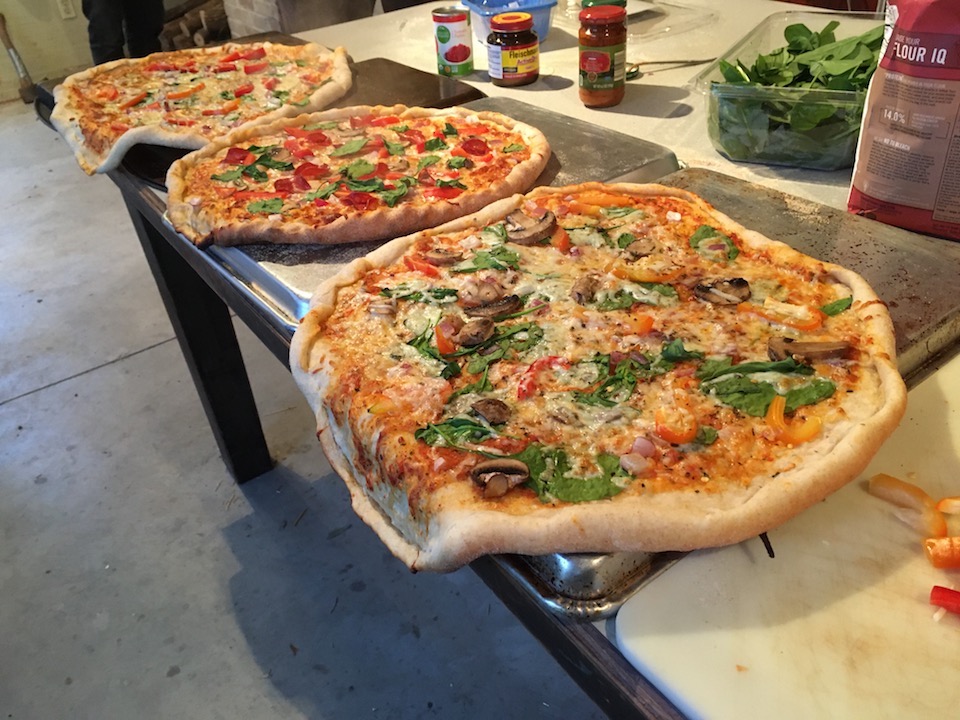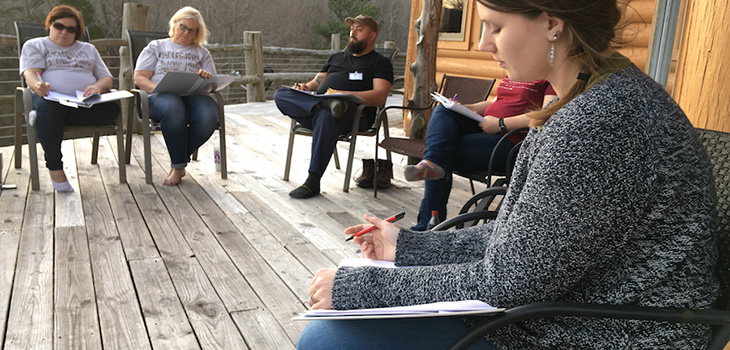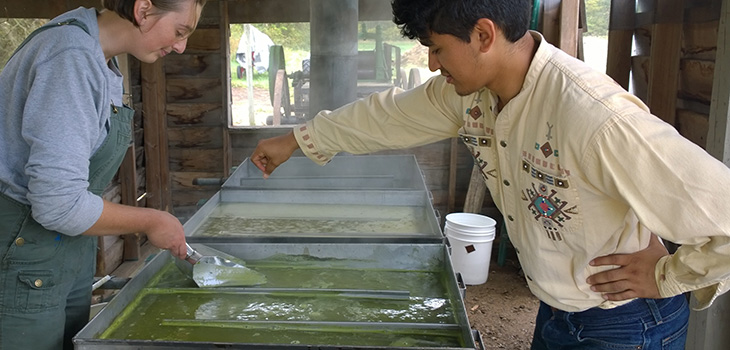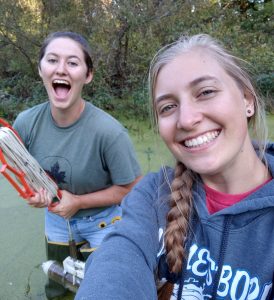 It’s been nearly two months since the seventh cohort of undergraduates completed Merry Lea’s Sustainability Leadership Semester (SLS). Between mid-August and mid-December, they shared classes, meals, field trips, hikes, social activities and a weeklong canoeing adventure.
It’s been nearly two months since the seventh cohort of undergraduates completed Merry Lea’s Sustainability Leadership Semester (SLS). Between mid-August and mid-December, they shared classes, meals, field trips, hikes, social activities and a weeklong canoeing adventure.
The SLS is designed for students who want to help create a resilient future for their communities despite our rapidly changing planet. Experiential learning, immersion in the natural world, interdisciplinary perspectives and personal leadership development are hallmarks of the semester. It is required for students in Goshen College’s sustainability studies major. It is also open to students from any discipline who want to earn a minor in sustainability, and to professionals who can take it for certificate. This year’s cohort included students pursuing sustainability studies, sustainability management, environmental science, American Sign Language and English.
I attended the presentations the SLSers gave on their final projects in December. More recently, I tracked down three of the students to find out what they took with them when they left. It was apparent that meaningful relationships with other students and faculty had been important to them. They also appreciated educational experiences that recognize the whole person. The SLS integrates academics with activities such as nature hikes, preserving food and periods of silence.
Complexity
I expected these responses. The common thread that surprised me more was their cheerful appreciation for complexity.
The students I listened to had no illusions that moving a society in more sustainable directions would be simple, but this was coupled with a surprising good humor about it. They assumed there were ways they could effect change. It might even be fun! This is refreshing in an era increasingly prone to gloom and black-and-white thinking.
Petra Showalter, Goshen, Ind., described a deepening desire to understand the systems we all live in and how to responsibly participate in them.
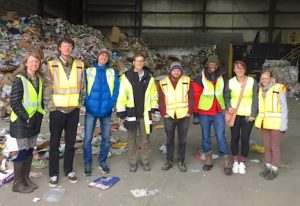 “It’s not always intuitive what sustainability looks like in your own context,” she said. This point was brought home to her on a field trip to Borden Waste-Away, a recycling facility in Elkhart, Ind. The tour guide told the class that while there were viable ways for a for-profit company to recycle cardboard, aluminum and plastic bottles, recycling glass was an expensive burden to the company. The abundance of sand in the Michiana region made it difficult to find buyers for glass, and it had to be shipped to Chicago.
“It’s not always intuitive what sustainability looks like in your own context,” she said. This point was brought home to her on a field trip to Borden Waste-Away, a recycling facility in Elkhart, Ind. The tour guide told the class that while there were viable ways for a for-profit company to recycle cardboard, aluminum and plastic bottles, recycling glass was an expensive burden to the company. The abundance of sand in the Michiana region made it difficult to find buyers for glass, and it had to be shipped to Chicago.
Elena Meyer-Reimer, Goshen, Ind., reflected on the scale at which modern societies operate limits and the ways this limits how sustainably things can be done. Within one week, the SLSers observed Merry Lea team members butchering a chicken in preparation for an educational program, helped butcher a deer, visited a small meat packing plant on a farm and toured a larger operation. Elena found the contrast between one chicken and a conveyor belt full of chickens jarring. She saw how much easier it was to treat one animal with respect than it was hundreds.
Elena was also struck by the amount of background work any given action can require.
“Even when we agree on issues like climate change, that’s not enough,” she remarked. She recalled a meeting with aides from Senator Mike Braun’s office. The SLSers were there to discuss a bi-partisan climate caucus that the senator had introduced in October. While she found hope in the caucus’ consensus that climate change must be addressed, it was also clear that there was no agreement on strategies for doing so. Far more work would be needed before any action could happen.
To further complicate matters, students found examples of visionary thinking in unexpected places. On another field trip to a gravel pit, Petra recalls her surprise when the owner described his vision for restoring the land once extraction was completed.
“I thought I would have a lot of critiques of the operation, but I actually saw he was taking responsibility for the land,” she said.
Problem-solving projects
Throughout the semester, students worked with local businesses or non-profits on projects related to that organization’s needs. These hands-on experiences contributed to the sense of realism students displayed. A project as straightforward and hope-filled as creating a .3-mile nature trail still requires a host of complex decisions. Christian Gehman and Petra Showalter worked with the Loon Lisle Property Association to draw up plans that would allow the property owners to access the Noble County lakefront they were preserving.
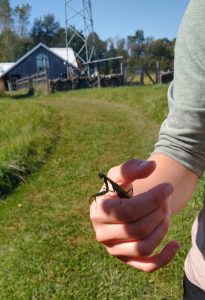 How wide should the trail be? Is recycled rubber or gravel preferable? What seed mix is most appropriate for the area reserved for a native prairie planting? Why is it important that the border be curved? What maintenance will be required and how much is all this going to cost? They needed to answer each of these questions in order to present their proposal.
How wide should the trail be? Is recycled rubber or gravel preferable? What seed mix is most appropriate for the area reserved for a native prairie planting? Why is it important that the border be curved? What maintenance will be required and how much is all this going to cost? They needed to answer each of these questions in order to present their proposal.
Levi Ebersole worked with the Elkhart County Food Council, an organization seeking to improve food quality and security for the community. Assisting an all-volunteer organization with limited means gave him a chance to tackle questions more often reserved for CEOs. He spent a lot of time researching organizational structures that might strengthen the food council and proposed social media strategies that could raise its profile.
Elena worked with Leo’s Restaurant in Elkhart. Inspired by a creation care emphasis at his church, the owner was interested in greening his operation. Elena discovered resources like the Green Restaurant Association and a food waste reduction tool. Even though just one site was involved and the owner was driving the desire for change, there were still barriers to negotiate. Switching light fixtures and taps was the easy part. Working with food regulations and customer choices required compromises.
Despite having survived a semester designed to temper rosy idealism, the SLS students I spoke with seemed none the worse for wear. Luke Vance is an example of someone who seems to have come out of the SLS with more enthusiasm than he brought into it.
He describes backpacking trips in his home state of Idaho and the effects of capitalism on the environment with equal fervor and animated hand gestures. His dream for the future? One that will be partially realized this summer through an internship with the Sierra Club Idaho. It’s perfect for an aspiring writer: helping people tell stories about nature.
“I believe storytelling is one of the most powerful tools we have,” he says.
The students I interviewed had foraged for mushrooms and seen bald eagles. They’d begun a day’s paddling by dipping their fingers into the Elkhart River and savoring the quality of light. They’d crafted fresh vegetables from the Merry Lea Sustainable Farm into fun meals. Then, they’d cleaned up the dishes together. Whatever failures they’d witnessed, whatever the disillusionment they may have suffered, it was masked by the fact that they’d had a roaring good time. May we all end our semesters—and our lives—on that note.
